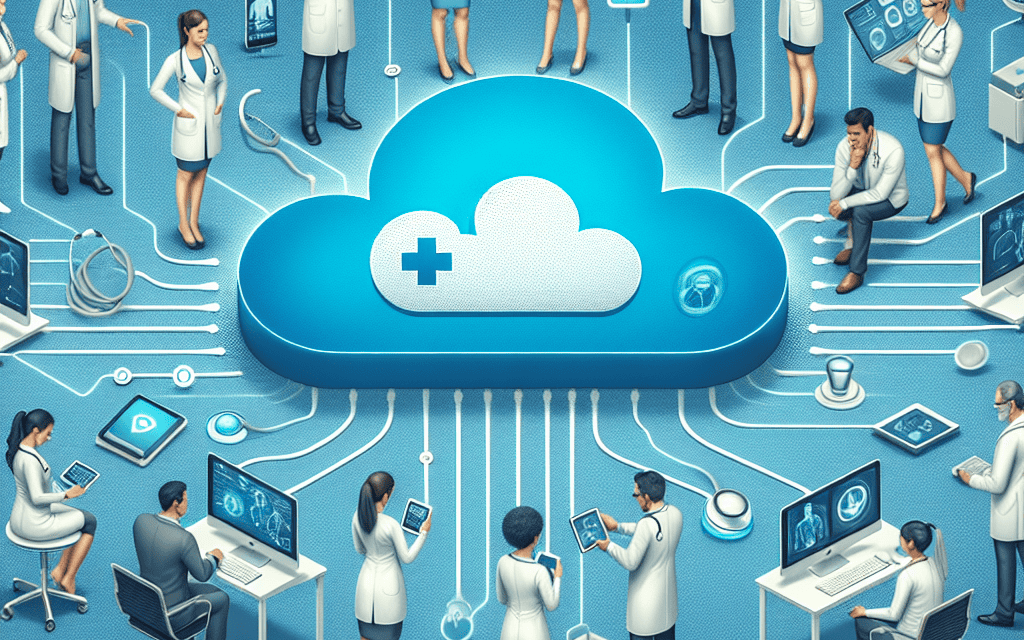Insights from the Latest Research on Cloud Technology in Healthcare

Cloud technology has revolutionized various industries, and healthcare is no exception. The integration of cloud solutions in healthcare has brought about significant advancements in data management, patient care, and operational efficiency. This article delves into the latest research on cloud technology in healthcare, exploring its impact, challenges, and future prospects. We will examine five key subtopics, each providing detailed insights into different aspects of cloud technology in the healthcare sector.
The Role of Cloud Technology in Enhancing Healthcare Data Management
Effective data management is crucial in healthcare, where vast amounts of sensitive information are generated daily. Cloud technology offers a robust solution for managing this data efficiently and securely. Recent research highlights several ways in which cloud technology is transforming healthcare data management.
One of the primary benefits of cloud technology is its ability to store and process large volumes of data. Healthcare organizations generate massive amounts of data from electronic health records (EHRs), medical imaging, and patient monitoring systems. Cloud platforms provide scalable storage solutions that can accommodate this data, ensuring that healthcare providers have access to comprehensive patient information when needed.
Moreover, cloud technology facilitates seamless data sharing and collaboration among healthcare professionals. With cloud-based systems, medical practitioners can access patient records and collaborate on treatment plans in real-time, regardless of their location. This capability is particularly beneficial in telemedicine, where remote consultations require instant access to patient data.
Security is a paramount concern in healthcare data management. Cloud providers implement advanced security measures, such as encryption and multi-factor authentication, to protect sensitive patient information. Research indicates that cloud solutions can enhance data security by providing regular updates and patches to address vulnerabilities, reducing the risk of data breaches.
Additionally, cloud technology supports data analytics, enabling healthcare organizations to derive valuable insights from their data. By leveraging cloud-based analytics tools, healthcare providers can identify trends, predict patient outcomes, and optimize resource allocation. This data-driven approach enhances decision-making and improves patient care quality.
- Scalable storage solutions for large volumes of healthcare data
- Real-time data sharing and collaboration among healthcare professionals
- Enhanced security measures to protect sensitive patient information
- Support for data analytics to derive valuable insights
Improving Patient Care and Outcomes with Cloud-Based Solutions
Cloud technology is playing a pivotal role in improving patient care and outcomes. By enabling healthcare providers to access and analyze patient data more effectively, cloud solutions are transforming the way care is delivered.
One significant advantage of cloud technology is its ability to support personalized medicine. By integrating data from various sources, such as genetic information, lifestyle factors, and medical history, cloud-based systems can help healthcare providers tailor treatment plans to individual patients. This personalized approach enhances treatment efficacy and reduces the risk of adverse reactions.
Cloud technology also facilitates remote patient monitoring, allowing healthcare providers to track patients’ health status in real-time. Wearable devices and IoT sensors can collect data on vital signs, activity levels, and other health metrics, which are then transmitted to cloud platforms for analysis. This continuous monitoring enables early detection of potential health issues, allowing for timely interventions and reducing hospital readmissions.
Telemedicine is another area where cloud technology is making a significant impact. Cloud-based telehealth platforms enable virtual consultations, providing patients with access to medical care without the need for physical visits. This convenience is particularly beneficial for patients in remote or underserved areas, improving access to healthcare services and reducing travel-related barriers.
Furthermore, cloud technology supports the integration of artificial intelligence (AI) in healthcare. AI algorithms can analyze vast amounts of data stored in the cloud to identify patterns and make predictions. For example, AI-powered diagnostic tools can assist radiologists in interpreting medical images, improving diagnostic accuracy and efficiency.
- Support for personalized medicine through data integration
- Remote patient monitoring for real-time health tracking
- Telemedicine platforms for virtual consultations
- Integration of AI for improved diagnostic accuracy
Challenges and Considerations in Implementing Cloud Technology in Healthcare
While cloud technology offers numerous benefits, its implementation in healthcare is not without challenges. Healthcare organizations must navigate various considerations to ensure successful adoption and integration of cloud solutions.
Data privacy and security are major concerns when implementing cloud technology in healthcare. Healthcare organizations must comply with stringent regulations, such as the Health Insurance Portability and Accountability Act (HIPAA) in the United States, to protect patient information. Ensuring that cloud providers adhere to these regulations and implement robust security measures is critical to safeguarding sensitive data.
Interoperability is another challenge in the adoption of cloud technology. Healthcare systems often use different software and data formats, making it difficult to integrate and share information seamlessly. Cloud solutions must support interoperability standards to enable smooth data exchange between disparate systems, ensuring that healthcare providers have access to comprehensive patient information.
Cost is a significant consideration for healthcare organizations looking to implement cloud technology. While cloud solutions can reduce infrastructure costs, organizations must carefully evaluate the total cost of ownership, including subscription fees, data transfer costs, and potential expenses related to data migration and integration.
Additionally, healthcare organizations must address concerns related to data sovereignty and control. Storing data in the cloud may raise questions about data ownership and jurisdiction, particularly when using international cloud providers. Organizations must ensure that they retain control over their data and comply with local regulations regarding data storage and access.
- Ensuring compliance with data privacy and security regulations
- Addressing interoperability challenges for seamless data exchange
- Evaluating the total cost of ownership for cloud solutions
- Managing data sovereignty and control concerns
Case Studies: Successful Implementation of Cloud Technology in Healthcare
Several healthcare organizations have successfully implemented cloud technology, demonstrating its potential to transform healthcare delivery. These case studies provide valuable insights into the benefits and challenges of adopting cloud solutions in healthcare.
The Mayo Clinic, a leading healthcare provider in the United States, has leveraged cloud technology to enhance its research capabilities. By migrating its data to the cloud, the Mayo Clinic has improved data accessibility and collaboration among researchers. This transition has enabled the organization to conduct large-scale studies and accelerate the development of new treatments and therapies.
Another example is the National Health Service (NHS) in the United Kingdom, which has adopted cloud-based solutions to improve patient care and operational efficiency. The NHS has implemented a cloud-based electronic health record (EHR) system that allows healthcare providers to access patient information across different facilities. This system has streamlined care coordination and reduced administrative burdens, ultimately improving patient outcomes.
In India, the Apollo Hospitals Group has utilized cloud technology to expand its telemedicine services. By implementing a cloud-based telehealth platform, Apollo Hospitals has been able to provide remote consultations to patients in rural and underserved areas. This initiative has improved access to healthcare services and reduced the need for patients to travel long distances for medical care.
These case studies highlight the transformative potential of cloud technology in healthcare. By addressing challenges related to data management, interoperability, and security, healthcare organizations can harness the power of the cloud to improve patient care and operational efficiency.
- Mayo Clinic’s use of cloud technology for research collaboration
- NHS’s implementation of a cloud-based EHR system
- Apollo Hospitals’ expansion of telemedicine services through the cloud
The Future of Cloud Technology in Healthcare
The future of cloud technology in healthcare is promising, with ongoing advancements poised to further transform the industry. Emerging trends and innovations are expected to enhance the capabilities of cloud solutions, driving improvements in patient care and operational efficiency.
One significant trend is the integration of artificial intelligence (AI) and machine learning (ML) with cloud technology. AI and ML algorithms can analyze vast amounts of healthcare data stored in the cloud, providing valuable insights for diagnosis, treatment planning, and resource allocation. This integration is expected to enhance decision-making and improve patient outcomes.
Another emerging trend is the use of blockchain technology in conjunction with cloud solutions. Blockchain can enhance data security and integrity by providing a decentralized and tamper-proof record of transactions. This technology has the potential to address concerns related to data privacy and security, making it an attractive option for healthcare organizations.
The adoption of edge computing is also expected to impact the future of cloud technology in healthcare. Edge computing involves processing data closer to the source, reducing latency and improving real-time decision-making. This approach is particularly beneficial for applications such as remote patient monitoring, where timely interventions are critical.
Furthermore, the increasing focus on interoperability and data exchange standards is expected to drive the adoption of cloud technology in healthcare. As healthcare organizations strive to improve care coordination and collaboration, cloud solutions that support seamless data exchange will become increasingly important.
- Integration of AI and ML with cloud technology for enhanced decision-making
- Use of blockchain technology to enhance data security and integrity
- Adoption of edge computing for improved real-time decision-making
- Focus on interoperability and data exchange standards
Conclusion
Cloud technology is reshaping the healthcare industry, offering numerous benefits in data management, patient care, and operational efficiency. The latest research highlights the transformative potential of cloud solutions, from enhancing data security and supporting personalized medicine to enabling telemedicine and remote patient monitoring. However, healthcare organizations must navigate challenges related to data privacy, interoperability, and cost to fully realize the benefits of cloud technology.
Successful case studies demonstrate the positive impact of cloud technology in healthcare, providing valuable insights for organizations looking to adopt these solutions. As emerging trends such as AI integration, blockchain, and edge computing continue to evolve, the future of cloud technology in healthcare looks promising. By embracing these innovations, healthcare providers can improve patient outcomes, streamline operations, and drive advancements in medical research and treatment.





